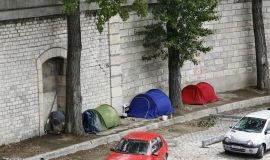There are a lot of observatories included in Apur's partnership programme. They respond to the needs of its partners, be they government representatives, administrations or institutions, by providing statistics in their field so that they can follow the progress and assess the initiatives as they are carried out.
-
Observatoires
Social impact of the crisis in Paris
 See more
See more -
Observatoires
Observatory of the Parisian economy
 See more
See more -
Observatoires
Support structures for innovative businesses in Métropole du Grand Paris
 See more
See more -
Observatoires
Grand Paris Express station neighbourhoods
 See more
See more -
Observatoires
Businesses and shops in Paris (BDCOM)
 See more
See more -
Observatoires
Parisian Families
 See more
See more -
Observatoires
Social Inclusion and Fight against Exclusion
 See more
See more -
Observatoires
Parisian Districts of the City of Paris' Policy
 See more
See more -
Observatoires
Disabled People’s Situation
 See more
See more -
Observatoires
Housing and Living Conditions
 See more
See more
Apur’s role
The observatories entrusted to Apur deal with social and urban issues. They generally include a large body of statistics.
The choice of assigning the development of these tools to Apur is linked to:
- the composition of Apur’s Board of Directors which brings together the principal key players in Paris and the Grand Paris Metropolis. Apur provides a favourable framework within which projects can emerge and be shared by all members.
- the composition of Apur’s multidisciplinary teams (notably its statisticians, economists and data processing specialists), who make the production and monitoring of such tools possible.
Basic Principles
Observatories run by Apur have the following common characteristics:
- A partnership - This is organised under the auspices of a department of the City of Paris. Partners vary according to the different observatories, the Government, nearly always, being involved.
- A steering committee and a monitoring committee - The former gives the direction, the latter follows the work as it is carried out.
- The presence of a “scientific authority” - A person of indisputable scientific expertise is chosen to follow the activities of the observatory and to vouch for the objectivity of the work and its scientific value.
- Establishing a database - A database is built to capitalise and monitor all the information, which is classified by year, by district, by type of information, etc.
- Creating documented files - A filing system has been devised so that each indicator is precisely described (its usefulness for the observatory, statistical limits, name of contributor, date of contribution, etc.).
